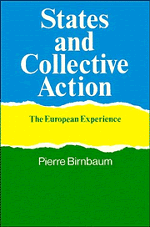Book contents
- Frontmatter
- Contents
- Acknowledgements
- Introduction
- 1 Mobilisation theory and the state: the missing element
- 2 States, free riders and collective movements
- 3 The state and mobilisation for war: the case of the French Revolution
- 4 Ideology, collective action and the state: Germany, England, France
- 5 Individual action, collective action and workers' strategy: the United States, Great Britain and France
- 6 The state versus corporatism: France and England
- 7 The Nazi collective movement against the Prussian state
- 8 Territorial and ethnic mobilisation in Scotland, Brittany and Catalonia
- 9 Nation, state and culture: the example of Zionism
- 10 The state, the police and the West Indians: collective movements in Great Britain
- Conclusion: the end of the state? From differentiation to dedifferentiation
- Notes
- Index
4 - Ideology, collective action and the state: Germany, England, France
Published online by Cambridge University Press: 04 August 2010
- Frontmatter
- Contents
- Acknowledgements
- Introduction
- 1 Mobilisation theory and the state: the missing element
- 2 States, free riders and collective movements
- 3 The state and mobilisation for war: the case of the French Revolution
- 4 Ideology, collective action and the state: Germany, England, France
- 5 Individual action, collective action and workers' strategy: the United States, Great Britain and France
- 6 The state versus corporatism: France and England
- 7 The Nazi collective movement against the Prussian state
- 8 Territorial and ethnic mobilisation in Scotland, Brittany and Catalonia
- 9 Nation, state and culture: the example of Zionism
- 10 The state, the police and the West Indians: collective movements in Great Britain
- Conclusion: the end of the state? From differentiation to dedifferentiation
- Notes
- Index
Summary
The sociology of knowledge establishes various kinds of links between ideologies and social settings. It endeavours to reveal a correlative or causal relationship between knowledge, in the general sense of the term, and the social system. Whether its inspiration is Marxist (from Marx to Lukács), Weberian (including the relationism of Mannheim) or functionalist or ethnomethodological, the sociology of knowledge interprets ideologies, world views or, indeed, values according as they are produced by a social class, a group or, again, an aggregate of interacting individuals. It never takes into account the specificity of politics, though this may revolutionise the conditions in which knowledge is produced. Marx, for example, saw the social classes as the only begetters of the ideologies which expressed their interests. In his view the representations, thought and intellectual commerce of men appeared here again as a direct emanation from their material behaviour. Similarly, according to the model that predominates in the works of Marx and Engels, the state is the state of the most powerful class, that which is economically dominant and which, by means of the state, becomes the politically dominant class as well. Marx never attempted, instead of linking forms of knowledge to social classes, to link them to the different types of states, although he did occasionally acknowledge their existence when, for example, he contrasted the French or Prussian state with the British or Swiss state.
- Type
- Chapter
- Information
- States and Collective ActionThe European Experience, pp. 67 - 80Publisher: Cambridge University PressPrint publication year: 1988



